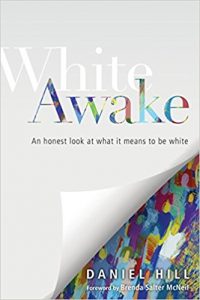 White Awake: An Honest Look at What It Means to Be White Daniel Hill (IVP) $16.00
White Awake: An Honest Look at What It Means to Be White Daniel Hill (IVP) $16.00
Saturday night Beth and I both sensed that we were more exhausted than usual; we keep weird hours and often are drained, it seems, but this was something else. And it was obvious to us what was behind it.
The night before we watched hours of live footage of the “Unite the Right” march, complete with Nazi slogans, Hitler salutes, and all kinds of white supremacist and anti-immigration meanness. As the shouting men with torches surrounded the Charlottesville church where Christians and others worshiped – including some friends of ours! – I was in an unpleasant Facebook debate with a person who insisted that this faith-based counter-witness of worship was not really faith-based. His spreading disinformation about my pious friends upset me almost as much as the trauma of seeing the vile chanting and creepy flags of the far, far right as they advanced on Mr. Jefferson’s university.
The next day we gathered at our own local church for a memorial service for a dear friend, a black woman who was an inner city school teacher most of her adult life, and whose family have offered good leadership to our Presbyterian congregation. Miss Jenny co-taught third grade Sunday school for decades, including to all three of our children, not to mention our current Associate Pastor when she was child coming up our congregation. Pastor Allison’s sermon/eulogy shared not only important insights about Jenny’s passion for ethnic diversity and racial justice, but recalled her own years “in pig tails and patent leather shoes” when Jenny so influenced her, sowing seeds that have come to fruition in Allison’s own call to pastoral ministry. Knowing that overt evil was marching in Charlottesville even as we laughed and cried and prayed and received communion in our multi-ethnic service celebrating the quiet life of a faithful black Presbyterian was, well, exhausting.
“Funerals are hard work,” Beth reminded me, even as we knew this one was joyous in some regards. A truly Christian funeral of one who dies well in the Lord can be a celebration, but this one was layered with the awful news of this awful reality about racism in America, this concurrent outrage unfolding just a few states away. The testimonies about Jenny’s pioneering work in racial reconciliation between an all-black and an all-white church during race riots in York in the mid-1960s and her on-going passion for teaching about diversity to our children would have been powerful in any season. To hear it on Saturday was remarkably poignant. And it was exhausting.
I realized that it was okay to admit to being drained.
But I also realize that as a white person celebrating the life a beloved friend at a wholesome church service, merely checking in on my phone about the alt-right rally, wasn’t threatening to me. I realize that it illustrates a bit of what we sometimes call white privilege; I was sad about so much, but the white nationalists weren’t after me, and I could go home safe and satisfied that I knew a civil rights leader in our town. I learned years ago from a good black friend that even as he honored my own growing awareness and dislocation about matters of racism that he experienced, those of us who are white allies in the journey to justice can walk away, take a break, blend in. It is what it is, as they say, but learning to be aware of such privilege, learning to recognize, manage and steward it, even, is a long, life-long journey.
By the way, in a brand new book edited by Adam Copeland, with a foreword by Dorothy C. Bass, called Beyond the Offering Plate: A Holistic Approach to Stewardship (WJK; $20.00) a group of mostly Lutheran and Presbyterian theologians and Bible scholars offer chapters on a variety of aspects of stewarding well our givens — our bodies, our time, our work, our minds. Margaret P. Aymer, a New Testament professor at Austin Presbyterian Theological Seminary has a chapter called “Stewardship Of Privilege” in which she deconstructs the notion, in favor of a “stewardship of incarnation.”
There are a lot of voices from a lot of perspectives trying to help us think and live faithfully in these times.
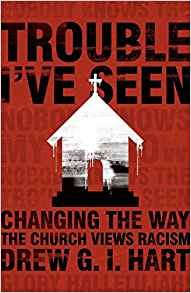 My friend Drew Hart, who used to work for the CCO, has a story in his must-read Trouble I’ve Seen: Changing the Way the Church Views Racism (Herald Press; $16.99) where he is in a meeting for those who were pretty invested in and further along the journey to dismantle white supremacy, a small group heart-to-heart about deep stuff regarding our racial identity and moving towards a more just and equitable future. In this story, Hart is taken aback when a woman from the meeting is agitated and asks to speak with him after the meeting. She trusted him and wondered what he thought of the consensus in the group that one can’t be a real Christian if one is white.
My friend Drew Hart, who used to work for the CCO, has a story in his must-read Trouble I’ve Seen: Changing the Way the Church Views Racism (Herald Press; $16.99) where he is in a meeting for those who were pretty invested in and further along the journey to dismantle white supremacy, a small group heart-to-heart about deep stuff regarding our racial identity and moving towards a more just and equitable future. In this story, Hart is taken aback when a woman from the meeting is agitated and asks to speak with him after the meeting. She trusted him and wondered what he thought of the consensus in the group that one can’t be a real Christian if one is white.
Huh?
That wasn’t at all what was said in the meeting and yet Hart wasn’t fully surprised. It is almost predictable that some white folks think that a critique of the system of white privilege in our culture – the structures and social architecture, the principalities and powers, the institutional racism – is an attack on them individually, as people.
But this time, Hart decided not to just simply reassure her that she misunderstood, that nobody in the meeting had said such a hurtful thing. (He did say that, of course, but she insisted otherwise.) So he invited her to sit with her discomfort a bit. He asked probing questions, inviting her to ask why it was that she so misheard, so misinterpreted. What was it about her own deep, deep loyalty to her identity as a white person that set her off? Could it be that as Christians, we ought to have identities less shaped by our race? It is quite a story in a very impressive book that is increasingly known as a key book for our time. Dr. Hart lives in the Harrisburg area and now teaches theology at Messiah College near us. Daniel Hill uses that story from Hart’s book to open us up to often misunderstood conversations about our identity and how race and class or national loyalties sometimes effects our self-understanding.
It seems to me Drew was right in pushing this woman a bit. And it was a powerful illustration for Hill in his new book. Both men are experience facilitators of these kinds of conversations and want to remind us: we are “new creatures” in Christ, after all, defined by our baptism, shaped by our union with Him, informed by our membership in the church, fundamentally claimed by our allegiance to God’s Kingdom coming. Of course we are made by God as creatures which certainly involves God-given race and gender and abilities and gifts and such, and we are naturally shaped by families and cultures, citizens of a country, situated in a place — all there for better or worse because this is the sort of world God made: real, material, social, cultural, situated. Yes, we are created in God’s image with these material facts and they should be celebrated. But what happens when we overly identity with our race or tribe or homeland? What happens, more, when that race or tribe or homeland is a majority culture that is known for marginalizing and hurting others? What does it mean to be white in a racially-charged culture? Even those of us who would never shout “Blood and Soil” as the alt-right marchers did in Charlottesville, might it be that we unconsciously carry a few too many eggs in the basket of our whiteness?
Not to be too clever, but how should our race color our faith?
This, my friends, is one of the primary tasks set before contemporary Christians the world over, and it is certainly one of the chief tasks set before North American Christians of Anglo descent. White folks are still a majority race and white supremacy is still the common currency of the culture. (Wes Granberg-Michaelson’s thrilling From Times Square to Timbuktu: The Post-Christian West Meets the Non-Western Church reminds us that this is changing as the global church is no longer mostly white and is no longer found only in the global South.)
And, aside from the influence of non-Western, global Christians, we in the US have to grapple with our own diversity issues, obviously around black/white relations in this era of the new Jim Crow, but also with the rise of the Latino church, the Asian-American church, and the on-going relationship with our Native Peoples. For anyone that travels to church conferences or has worshiped outside of their own local church, you know this isn’t abstract or arcane — happily the Body of Christ is remarkably multi-cultural. Some mainline churches have been addressing this for decades, although evangelicals seem to be most energetic these days at the grass roots level. Pentecostals know it for sure. All of us who are white simply have to consider how being white has influenced our identities and how our implicit privileges (even for those of us whose lives are hard) have tilted societies blessings in our favor.
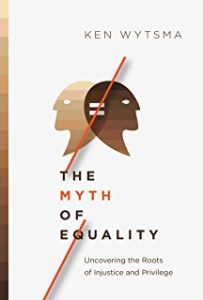 By the way, the best Christian book about this “white privilege” phrase (a phrase outlawed in at least one Christian college chapel program!) and what it all means and implies and what to think about it is Ken Wytsma’s The Myth of Equality: Uncovering the Roots of Injustice and Privilege (InterVarsity Press; $18.00.) I reviewed that exceptionally important book recently at BookNotes and hope you picked it up from us. It is very well written and more timely than ever given the events of recent days. Lisa Sharon Harper says that “This book is a journal of discoveries shared with humility, grace, and unrelenting commitment to truth.”
By the way, the best Christian book about this “white privilege” phrase (a phrase outlawed in at least one Christian college chapel program!) and what it all means and implies and what to think about it is Ken Wytsma’s The Myth of Equality: Uncovering the Roots of Injustice and Privilege (InterVarsity Press; $18.00.) I reviewed that exceptionally important book recently at BookNotes and hope you picked it up from us. It is very well written and more timely than ever given the events of recent days. Lisa Sharon Harper says that “This book is a journal of discoveries shared with humility, grace, and unrelenting commitment to truth.”
And Wystma himself recommends this new book, quite heartily, in fact.
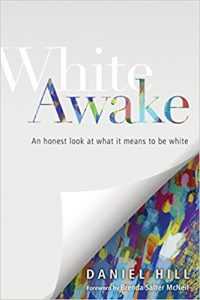 Daniel Hill is an evangelical Christian leader who has worked on multi-ethnic ministry, racial reconciliation, and cultural diversity for most of his adult life. As he describes in his riveting new paperback book, White Awake: An Honest Look at What It Means to Be White (IVP; $16.00) this question – how do we handle the fact of white supremacy and deal with the givens of white privilege? – is urgent but painful. offers strategies to learn, and strategies to move forward.
Daniel Hill is an evangelical Christian leader who has worked on multi-ethnic ministry, racial reconciliation, and cultural diversity for most of his adult life. As he describes in his riveting new paperback book, White Awake: An Honest Look at What It Means to Be White (IVP; $16.00) this question – how do we handle the fact of white supremacy and deal with the givens of white privilege? – is urgent but painful. offers strategies to learn, and strategies to move forward.
But for Hill, there is something equally important to explore besides the ubiquitous and fraught questions about privilege. And that is the question of identity.
And on this, White Awake is the best thing I’ve ever read.
Hill’s new book is helpfully arranged, nicely crafted and well-written, upbeat at times and searing at others. It’s almost a perfect non-fiction book with just the write balance and flow of good humor and inspiring passion and wise Bible study and clarifying theology and stories galore. And what stories he tells – some fairly common place, about his own failures in building cross-cultural friendships and some nearly stunning in how they shine a light upon gross injustices in a racialist culture.
Hill seemed to drift from faith a bit in his college years – his father was a strict and conservative Baptist preacher – but as he explains in the book, his renewed faith in his early twenties lead him to a leadership role in the young adult ministry at Willow Creek. A story he tells about the membership meeting he had with them is funny and poignant as they remind him that salvation is by grace alone and he didn’t really have to prove his worth to them. Maybe some self-righteousness was going on there, even? What a vulnerable thing to share!
Willow eventually freed him up to start an urban young adult fellowship which Hill deeply hoped would be multi-cultural and embody God’s desire for racial unity. The urban version of their legendary Axiom group grew and grew but remained mostly white. He felt like a failure. I was captivated by this episode in his life and there is much to learn for any of us. In those years he wisely surrounded himself with people of color (including some honest black, Asian, and Latino pastors) who were brutally honest with him and caringly coached him towards greater clarity about the cost of his idealistic visions.
And that cost is in a way what White Awake is all about.
I believe it is the best and most useful book about race I have read in years. (And, if you follow our reviews here at BookNotes, you know I have read and reviewed a lot.) It is serious but approachable, challenging without being devastating, and offers information that is essential for all of us (of any race or background) to understand well.
Perhaps you have never read anything that makes the Biblical case that God abhors injustice, that racial bias continues to haunt North America, and that Christ’s church is called to be multi-ethnic, bearing witness to the reconciliation God is bringing among us. I suppose if you’ve never read anything about a Christian view of diversity or the Biblical teaching about a multi-cultural church, this book might not be the one to start with.
See our suggestions about more basic and general books on race in the second half of this BookNotes list here or some of the ones here (which includes basic and advanced ones) or this recent list here which lists several favorites of various levels and styles.
But if like many BookNotes readers – pastors in mainline churches, activists in evangelical congregations, campus ministers in the CCO and IVCF and Cru and RUF and the like – you’ve already made some commitments to addressing the sins of racism and pressing on towards racial reconciliation, then this is the book you need to read next.
I’ll say it again: if you’ve read a bit in the topic of race relations, White Awake: An Honest Look At What It Means to Be White is what you should read next.
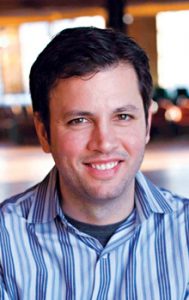 As I’ve said, you will enjoy (and learn much from) Mr. Hill’s honest storytelling and his vulnerability as a learner – and, man, is he vulnerable, candidly sharing some zingers of missteps and some epic fails in his well-intended efforts to be more racially aware and become a multi-cultural leader. His conversational tone, his walking us through the stages and phases and ups and downs (and, again, did I mention there were some downs?) as he chronicles his journey in living color is all very, very helpful. That he has had a lot of important influences (itself a privilege) from people of color is pretty rare and he tells of the hard truths his friends have helped him see. There were moments when I thought, wow, they could make a movie out of this guy’s life!
As I’ve said, you will enjoy (and learn much from) Mr. Hill’s honest storytelling and his vulnerability as a learner – and, man, is he vulnerable, candidly sharing some zingers of missteps and some epic fails in his well-intended efforts to be more racially aware and become a multi-cultural leader. His conversational tone, his walking us through the stages and phases and ups and downs (and, again, did I mention there were some downs?) as he chronicles his journey in living color is all very, very helpful. That he has had a lot of important influences (itself a privilege) from people of color is pretty rare and he tells of the hard truths his friends have helped him see. There were moments when I thought, wow, they could make a movie out of this guy’s life!
And he tells the exciting stories of deepening commitments to fighting racism of others, too, from hip- hop star Lacrae to social scientist (and now Duke Divinity School professor) Christena Cleveland, from social psychologist Brene Brown to civil rights lawyer Bryan Stevenson, from NYC pastor Tim Keller, from urban activist Shane Claiborne. Such shout outs make this a really interesting book.
Dr. Hill draws on key scholars writing on this topic these days, too. For instance, his overview of the work of Beverly Tatum (Why Are All The Black Kids Sitting Together in the Cafeteria?) and his drawing upon the notions of “white fragility” by Robin DiAngelo are very, very useful.
Besides enjoying (and cringing) through the lessons Hill learned too often the hard way, and rooting him on as he shows tenacity, perseverance and resilience, you will learn good, good stuff about what it means to be a “woke” white person these days. You will be motivated to do some self-assessment, you will be chided and encouraged and some dots will surely be connected as lights come on in your own soul. You will learn a lot and I think you will really, really appreciate it.
And in all this, Hill is impeccably clear, offering succinct outlines, fine bullet points, helpful reviews. The book makes a lot of sense. There is excellent teaching from sociology and psychology and a couple of pages are a little dense for those not use to the recent research, but it is well explained and there are good footnotes. He also draws often on the traditions and insights of spiritual formation. He gets how it is that people come to deeper maturity, how worldview transformation happens, how we align our identity with Christ, and how we can grow and change and clarify our deepest biases and default settings when it comes to how we walk through this world. He’s a good thinker and a very good teacher.
After some great introductory chapters (“The Day I Discovered My World Was White”) and a must-read study of how unhelpful of language of colorblindness is (in a chapter called “What is Cultural Identity?”) Daniel Hill offers seven stages white folks can go through in deepening their growth into being a Christ-shaped ally for racial justice.
Hill describes these phrases under the chapter titles of:
- Encounter
- Denial
- Disorientation
- Shame
- Self-Righteousness
- Awakening
- Active Participation
Further, within each stage he explains possible obstacles, roadblock to overcome or insights need to be gathered. I loved his page or two on a wholistic Kingdom vision. His remarks about the difference between shame and guilt are right on. His comments about the nature and usefulness of lament are worth the price of the book. And – trust me on this – his point about how dismantling white supremacy is more important than diversity is essential and should be discussed widely among us. His own River City Community Church has learned over time a great deal about all this, and it is a great gift that Hill has put it all together in this fine book.
Hill tells stories of his own journey and warns us not to jump to quickly from one stage or phase to another. One of the distinctive characteristics of white middle-class American culture – which is not all bad, of course – is to promptly try to solve problems, often quickly, barging to pragmatics without adequately understanding things. In even the most profound of deep conversations between races about hurt and injustice and implicit bias and more, white folks almost always say “what should I do?” Which, as Hill explains, is well-intended, but not really the best first response. He explains why and it is a good thing to learn from him. (In one of the humorous stories near the end of the book Daniel is telling about a workshop he was doing, helping some folks struggle with all of this, and one of the earnest participants said, “I know I’m not supposed to ask this, but…” and then asked the “What Should I Do” question, just using other words. They all got a laugh about how ingrained this move is, wanting to jump to action, sometimes before sitting with the questions, being humble enough to learn, processing our own identity issues before trying to solve the problems of race by offering white leadership.) Anyway, through good teaching and helpful stories, we learn how to process these stages well, deeply, with integrity,
Daniel Hill guides us through these steps, by the way, with lots of Bible teachings which are naturally integrated into the text. Even the typography of the book makes it easy to follow the flow of his points and sub-points. Good job, IVP!
There are discussion questions at the end of White Awake and they are exceptionally profound. White Awake is so useful that it has gleaned great blurbs of endorsement from the leadership likes of Shauna Niequist, Ken Wytsma, Efrem Smith, Mark DeYmaz, Grace Ji-Sun Kim, and John Perkins (“I would encourage every Christian to read it.”)
I agree with what Michael Wear says when he writes:
A profoundly pastoral book with serious implications for the ecclesial, social, and political life of our nations… Readers can trust Daniel Hill to tell them the truth about racism and white supremacy. Hill does not use these fraught issues to manipulate, but rather to help his readers see more clearly. If Christians read and consider this book carefully, it will help them. It helped me.
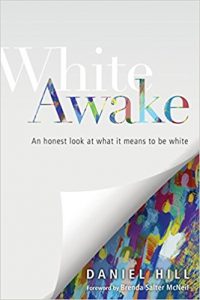
BookNotes

SPECIAL
DISCOUNT
ANY ITEM MENTIONED
20% Off
order here
takes you to the secure Hearts & Minds order form page
just tell us what you want
inquire here
if you have questions or need more information
just ask us what you want to know
Hearts & Minds 234 East Main Street Dallastown, PA 17313
read@heartsandmindsbooks.com
717-246-3333
